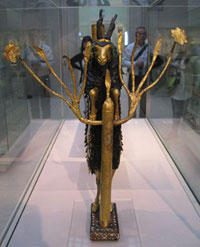First appeared in Science Fiction Writers of America Blog August 2012
 Ideas for my stories come to me in museums, in galleries, in gulibraries. Find me upstairs (and it’s always quieter upstairs) in the British Museum trawling the past looking for future inspiration.
Ideas for my stories come to me in museums, in galleries, in gulibraries. Find me upstairs (and it’s always quieter upstairs) in the British Museum trawling the past looking for future inspiration.
Old books, paintings, objects are part of our material heritage. Survivors of the ravages of times, sometimes cherished throughout the ages, sometimes forgotten, dug from the ground, broken and then reconstruction. Objects tell stories. Museums select and interpret these stories, grouping objects together to give a window into the past.
Museum objects are rich in concrete detail for stories. And not just for fantasy stories, set in the real or imagined past. A detail from the past can act as a springboard for a story about the future. Looking at the helmet of a 10th century Norwegian chief leads me to consider what armour a space Viking might wear (Space Vikings! Now I want to write a space Viking story). Looking at a beaten gold headdress from ancient Ur makes me wonder how the woman felt wearing such a beautiful and precious item. How did her society shape her? How will my future society shape my characters? An object in a museum will catch my attention. Why was this sword engraved with the image of a bear? And that will send me down a pathway of research.
Some museums collect the finest pieces of the past, the most costly, the most cherished. Objects may be monumental, priceless and awe-inspiring. But these are not the only stories to be told. Sadly many objects from the past of the working person have been lost. Yet, you can still glimpse the lives of working folk painted as rural scenes on objects. And social museums seek to recapture a glimpse of the ordinary, the everyday.
Objects, books and paintings are material records of the stories told in the past, the stories of religion and mythology. You can read the changing nature of stories through objects. Creation stories, eschatologies, the stories of the gods as their worshippers migrate and change, stories of lovers seeking to retrieve their beloved from the underworld. Some stories are repeated through the ages. What element has gripped so many imaginations?
Musuems don’t always look backwards. In the British Museum’s African Galleries there’s a sculpture called Tree of Life (2004) constructed out of decommissioned rifles. Science museums examine the science of the past, the future and even trends for the future.
The presence of an object in a museum in a story in itself. The Parthenon Marbles, the Benin Bronzes (and others) on display in London are subject to repeated calls to be returned to their countries of origin. These objects tell stories of colonialism, empire, and war.
Though I love the massive, wealthy London museums and galleries, I’ve a fondness for the more obscure museum. After all, I used to work for one, as curator of the Royal Veterinary Museum. In London you can visit Alexander Fleming’s laboratory, or visit the Royal College of Surgeons Museum to explore the ideology that underpinned medicine for thousands of years. University are centres of research and specialism. Their collections are often open to the public by appointment. It’s worth trying a visit to a museum outside your area of interest. Volunteering to help out during my daughter’s school trip took me to the Imperial War Museum, I saw a wealth of cool spy gadgets that will no doubt work their way into some of my stories.
I live in London, and this article has been about London’s cultural wealth. But you can find wonderful museums everywhere. Holidays at home or abroad are opportunities to glimpse other cultures. A family wedding in Cyprus found me in a small museum examining of hundreds of votive offerings, clay figurines of a men on horseback. A collection that I couldn’t have seen anywhere else. I’m Derbyshire born and bred. Derby’s Museum has a wonderful collection of Joseph Wright of Derby’s atmospheric paintings exploring the development of modern science during the Enlightenment. A bus ride from my home town takes me to the D.H. Lawrence Museum, and to the National Trust’s Museum of Childhood. And sometimes history can’t be constrained to a building. I like the prehistoric stones ring at Arbour Low in Derbyshire that sometime in the past has been pushed over. The standing stones are fallen, nobody remembers why. There’s history everywhere.
And there’s the internet. Museums have embraced the internet seeking to widen access to their collections. It’s not, in my opinion as good as seeing the real thing. (Who can forget standing under the real-size model of the Blue Whale at the Natural History Museum?) But museum websites are a valuable resource.
And if you do take a trip to a museum, don’t forget to take a tour. Curators love to talk their collections. They have a passion for them. And curators are people who want to communicate stories. I should know; I used to be one.
•••
Two of Deborah’s stories inspired by the London’s cultural heritage are “The Bio-Documentarian of the British Library” published in Cosmos, and “Green Future“ published in Nature’s Futures.


